MENU
The Electronic Scholarly Publishing Project: Providing access to classic scientific papers and other scholarly materials, since 1993. More About: ESP | OUR CONTENT | THIS WEBSITE | WHAT'S NEW | WHAT'S HOT
Comparative Timelines
The ESP Timeline (one of the site's most popular features) has been completely updated to allow the user to select (using the timeline controls above each column) different topics for the left and right sides of the display.
Select:
New Left Column
New Left Column
Dates
Decade
New Right Column
New Right Column
(no entry for this year)
1870
(no entry for this year)
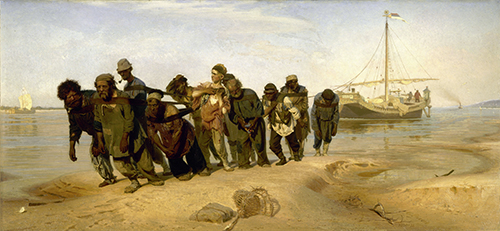 Painting by Ilia Efimovich Repin: Barge Haulers on the Volga or Burlaki (Russian: Burlaki na Volge) is an 1870 73 oil-on-canvas painting depicting laboring men dragging a barge on the Volga River. The men seem to almost collapse forward in exhaustion under the burden of hauling a large boat upstream in heavy, hot weather. The work is both a celebration of the men's dignity and fortitude, and a highly emotional condemnation of those who sanctioned such inhumane labor. Although they are presented as stoical and accepting, the men are largely defeated; only one stands out: in the center of both the row and canvas, a brightly colored youth fights against his leather binds and takes on a heroic pose.
Painting by Ilia Efimovich Repin: Barge Haulers on the Volga or Burlaki (Russian: Burlaki na Volge) is an 1870 73 oil-on-canvas painting depicting laboring men dragging a barge on the Volga River. The men seem to almost collapse forward in exhaustion under the burden of hauling a large boat upstream in heavy, hot weather. The work is both a celebration of the men's dignity and fortitude, and a highly emotional condemnation of those who sanctioned such inhumane labor. Although they are presented as stoical and accepting, the men are largely defeated; only one stands out: in the center of both the row and canvas, a brightly colored youth fights against his leather binds and takes on a heroic pose.
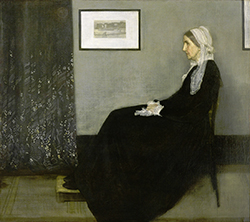 Painting by James McNeill Whistler: Arrangement in Grey and Black No.1, best known under its colloquial name Whistler's Mother, depicts Whistler's mother, Anna McNeill Whistler. The painting is 56.81 by 63.94 inches, displayed in a frame of Whistler's own design. It is exhibited in and held by the Musée d'Orsay in Paris, having been bought by the French state in 1891. It is one of the most famous works by an American artist outside the United States. It has been variously described as an American icon and a Victorian Mona Lisa.
Painting by James McNeill Whistler: Arrangement in Grey and Black No.1, best known under its colloquial name Whistler's Mother, depicts Whistler's mother, Anna McNeill Whistler. The painting is 56.81 by 63.94 inches, displayed in a frame of Whistler's own design. It is exhibited in and held by the Musée d'Orsay in Paris, having been bought by the French state in 1891. It is one of the most famous works by an American artist outside the United States. It has been variously described as an American icon and a Victorian Mona Lisa.
1871
 Publication of Charles Darwin's Descent of Man, in which the role of sexual selection in evolution is described for the first time.
Publication of Charles Darwin's Descent of Man, in which the role of sexual selection in evolution is described for the first time.
Lord Kelvin suggests that "the germs of life might have been brought to the Earth by some meteorite," an idea that will enjoy support a century later.
 Johann Friedrich Miescher isolates a substance which he calls NUCLEIN from the nuclei of white blood cells. The substance was soluble in alkalis but not in acids and came to be known as nucleic acid.
Johann Friedrich Miescher isolates a substance which he calls NUCLEIN from the nuclei of white blood cells. The substance was soluble in alkalis but not in acids and came to be known as nucleic acid.
 Lambert Adolphe Jacques Quetelet showed the importance of statistical analysis for biologists and laid the foundation of biometry.
Lambert Adolphe Jacques Quetelet showed the importance of statistical analysis for biologists and laid the foundation of biometry.
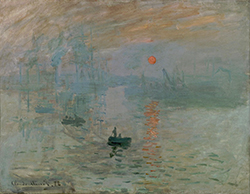 Painting by Claude Monet: Impression, Sunrise (French: Impression, soleil levant) was shown at what would later be known as the "Exhibition of the Impressionists" in April 1874. The painting depicts the port of Le Havre, Monet's hometown, and is his most famous painting of the harbor. Monet claimed that he titled the painting Impression, Sunrise due to his hazy painting style in his depiction of the subject: "They asked me for a title for the catalogue, it couldn't really be taken for a view of Le Havre, and I said: 'Put Impression.'" In addition to this explanation for the title of the work, art historian Paul Smith claims that Monet might have named the painting Impression to excuse his painting from accusations of being unfinished or lacking descriptive detail, but Monet received these criticisms regardless of the title
Painting by Claude Monet: Impression, Sunrise (French: Impression, soleil levant) was shown at what would later be known as the "Exhibition of the Impressionists" in April 1874. The painting depicts the port of Le Havre, Monet's hometown, and is his most famous painting of the harbor. Monet claimed that he titled the painting Impression, Sunrise due to his hazy painting style in his depiction of the subject: "They asked me for a title for the catalogue, it couldn't really be taken for a view of Le Havre, and I said: 'Put Impression.'" In addition to this explanation for the title of the work, art historian Paul Smith claims that Monet might have named the painting Impression to excuse his painting from accusations of being unfinished or lacking descriptive detail, but Monet received these criticisms regardless of the title
1872
 Ferdinand Julius Cohn coined the term BACTERIUM and founded the study of bacteriology.
Ferdinand Julius Cohn coined the term BACTERIUM and founded the study of bacteriology.
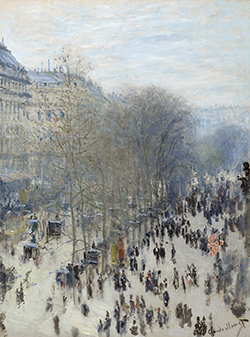 Painting by Claud Monet: Boulevard des Capucines. From the late 1860s, Monet and other like-minded artists, met with rejection from the conservative Académie des Beaux-Arts which held its annual exhibition at the Salon de Paris. During the latter part of 1873, Monet, Renoir, Pissarro, and Sisley organized the Société anonyme des artistes peintres, sculpteurs et graveurs to exhibit their artworks independently. At their first exhibition, held in April 1874, Monet exhibited the work that was to give the group its lasting name, Impression, Sunrise. Among the works Monet included in the first Impressionist exhibition was The Luncheon, 1868, which features Camille Doncieux and Jean Monet. The painting was rejected by the Paris Salon of 1870. Also in this exhibition was a painting titled Boulevard des Capucines, a painting of the boulevard done from the from the studio of Monet's friend, the photographer Felix Nadar.
Painting by Claud Monet: Boulevard des Capucines. From the late 1860s, Monet and other like-minded artists, met with rejection from the conservative Académie des Beaux-Arts which held its annual exhibition at the Salon de Paris. During the latter part of 1873, Monet, Renoir, Pissarro, and Sisley organized the Société anonyme des artistes peintres, sculpteurs et graveurs to exhibit their artworks independently. At their first exhibition, held in April 1874, Monet exhibited the work that was to give the group its lasting name, Impression, Sunrise. Among the works Monet included in the first Impressionist exhibition was The Luncheon, 1868, which features Camille Doncieux and Jean Monet. The painting was rejected by the Paris Salon of 1870. Also in this exhibition was a painting titled Boulevard des Capucines, a painting of the boulevard done from the from the studio of Monet's friend, the photographer Felix Nadar.
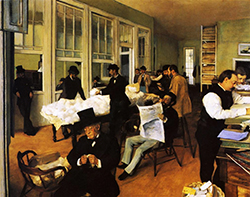 Painting by Edgar Degas: A Cotton Office in New Orleans depicts the artist's uncle Michel Musson's cotton brokerage business (which several years later went bankrupt in an economic crash, according to Michael McMahon of the Pittsburgh Post-Gazette when the firm was swamped by the postwar growth of the much larger Cotton Exchange). In the painting, Musson is seen examining raw cotton for its quality while Degas' brother René reads The Daily Picayune. Another brother, Achille, rests against a window wall at left while others, including Musson's partners, go about their business. A Cotton Office in New Orleans was the first painting by Degas to be purchased by a museum, and the first by an Impressionist. Degas' sale of the piece marked a turning point in his career as he moved from being a struggling, unrecognized artist to a recognized and financially stable artist, according to Marilyn Brown in her book Degas and the Business of Art: A Cotton Office in New Orleans. Degas traveled from Europe to New Orleans in late 1872 with his brother, René, to visit his mother's brother, Michael Musson. After the American Civil War, René had joined his uncle's cotton business in New Orleans. Degas was to return to Europe in January 1873, but when his return trip was delayed, he was asked by his relatives to paint their portraits, and decided to show them as a group, at work in the family office.
Painting by Edgar Degas: A Cotton Office in New Orleans depicts the artist's uncle Michel Musson's cotton brokerage business (which several years later went bankrupt in an economic crash, according to Michael McMahon of the Pittsburgh Post-Gazette when the firm was swamped by the postwar growth of the much larger Cotton Exchange). In the painting, Musson is seen examining raw cotton for its quality while Degas' brother René reads The Daily Picayune. Another brother, Achille, rests against a window wall at left while others, including Musson's partners, go about their business. A Cotton Office in New Orleans was the first painting by Degas to be purchased by a museum, and the first by an Impressionist. Degas' sale of the piece marked a turning point in his career as he moved from being a struggling, unrecognized artist to a recognized and financially stable artist, according to Marilyn Brown in her book Degas and the Business of Art: A Cotton Office in New Orleans. Degas traveled from Europe to New Orleans in late 1872 with his brother, René, to visit his mother's brother, Michael Musson. After the American Civil War, René had joined his uncle's cotton business in New Orleans. Degas was to return to Europe in January 1873, but when his return trip was delayed, he was asked by his relatives to paint their portraits, and decided to show them as a group, at work in the family office.
1873
 Anton Schneider observed and described the behavior of nuclear filaments (chromosomes) during cell division in his study of the platyhelminth Mesostoma. His account was the first accurate description of the process of mitosis in animal cells.
Anton Schneider observed and described the behavior of nuclear filaments (chromosomes) during cell division in his study of the platyhelminth Mesostoma. His account was the first accurate description of the process of mitosis in animal cells.
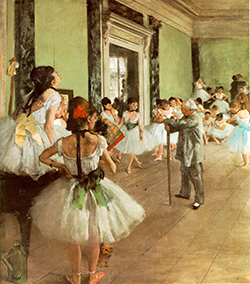 Painting by Edgar Degas: The Ballet Class (French: La Classe de danse) is in the collection of the Musée d'Orsay, Paris, France. It was commissioned by Jean-Baptiste Faure. Degas temporarily abandoned work on this painting, and delivered a work of a similar name to Faure. The painting depicts dancers at the end of a lesson under ballet master Jules Perrot. Perrot and Degas were friends, and Perrot allowed Degas access to dance classes.
Painting by Edgar Degas: The Ballet Class (French: La Classe de danse) is in the collection of the Musée d'Orsay, Paris, France. It was commissioned by Jean-Baptiste Faure. Degas temporarily abandoned work on this painting, and delivered a work of a similar name to Faure. The painting depicts dancers at the end of a lesson under ballet master Jules Perrot. Perrot and Degas were friends, and Perrot allowed Degas access to dance classes.
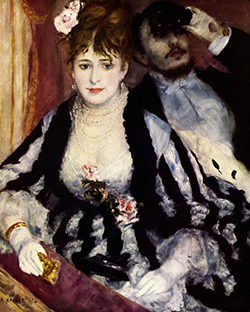 Painting by Pierre-Auguste Renoir: La Loge (The Theatre Box) depicts an elegant-looking couple sitting in an elevated theater box. This tribute to Parisian modern life was also the artist's principal contribution to the very first Impressionist exhibition of the same year, and it was met with much acclaim. It is now part of the collection at Courtauld Institute of Art in London.
Painting by Pierre-Auguste Renoir: La Loge (The Theatre Box) depicts an elegant-looking couple sitting in an elevated theater box. This tribute to Parisian modern life was also the artist's principal contribution to the very first Impressionist exhibition of the same year, and it was met with much acclaim. It is now part of the collection at Courtauld Institute of Art in London.
1874
(no entry for this year)
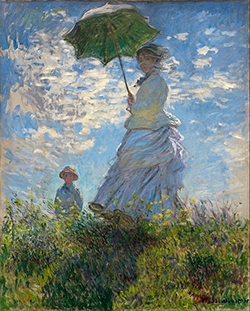 Painting by Claude Monet: Woman with a Parasol - Madame Monet and Her Son, sometimes known as The Stroll (French: La Promenade) depicts his wife Camille Monet and their son Jean Monet in the period from 1871 to 1877 while they were living in Argenteuil, capturing a moment on a stroll on a windy summer's day. The work is a genre painting of an everyday family scene, not a formal portrait. The work was painted outdoors, en plein air, and quickly, probably in a single period of a few hours. It measures 100 × 81 centimetres (39 × 32 in), his largest work in the 1870s, and is signed "Monet 75" in the lower right corner.
Painting by Claude Monet: Woman with a Parasol - Madame Monet and Her Son, sometimes known as The Stroll (French: La Promenade) depicts his wife Camille Monet and their son Jean Monet in the period from 1871 to 1877 while they were living in Argenteuil, capturing a moment on a stroll on a windy summer's day. The work is a genre painting of an everyday family scene, not a formal portrait. The work was painted outdoors, en plein air, and quickly, probably in a single period of a few hours. It measures 100 × 81 centimetres (39 × 32 in), his largest work in the 1870s, and is signed "Monet 75" in the lower right corner.
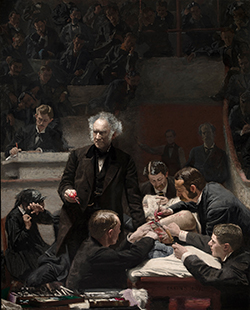 Painting by Thomas Eakins: The Gross Clinic, or, The Clinic of Dr. Gross, is large painting, measuring 8 feet (240 cm) by 6.5 feet (200 cm). Dr. Samuel D. Gross, a seventy-year-old professor dressed in a black frock coat, lectures a group of Jefferson Medical College students. Admired for its uncompromising realism, The Gross Clinic has an important place documenting the history of medicine both because it honors the emergence of surgery as a healing profession (previously, surgery was associated primarily with amputation), and because it shows us what the surgical theater looked like in the nineteenth century. In 1875, anesthesia was used, but sterile procedures were not.
Painting by Thomas Eakins: The Gross Clinic, or, The Clinic of Dr. Gross, is large painting, measuring 8 feet (240 cm) by 6.5 feet (200 cm). Dr. Samuel D. Gross, a seventy-year-old professor dressed in a black frock coat, lectures a group of Jefferson Medical College students. Admired for its uncompromising realism, The Gross Clinic has an important place documenting the history of medicine both because it honors the emergence of surgery as a healing profession (previously, surgery was associated primarily with amputation), and because it shows us what the surgical theater looked like in the nineteenth century. In 1875, anesthesia was used, but sterile procedures were not.
1875
 Eduard Strasburger accurately described the processes of mitotic cell division in plants.
Eduard Strasburger accurately described the processes of mitotic cell division in plants.
 Francis Galton demonstrates the usefulness of twin studies for elucidating the relative influence of nature (heredity) and nurture (environment) upon behavioral traits.
Francis Galton demonstrates the usefulness of twin studies for elucidating the relative influence of nature (heredity) and nurture (environment) upon behavioral traits.
 Oscar Hertwig concludes from a study on sea urchins that fertilization in both animals and plants consists of the physical union of the two nuclei contributed by the male and female parents.
Oscar Hertwig concludes from a study on sea urchins that fertilization in both animals and plants consists of the physical union of the two nuclei contributed by the male and female parents.
 Mark Twain publishes Tom Sawyer.
Mark Twain publishes Tom Sawyer.
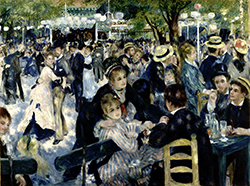 Painting by Pierre-Auguste Renoir: Bal du moulin de la Galette (commonly known as Dance at Le moulin de la Galette) is housed at the Musée d'Orsay in Paris and is one of Impressionism's most celebrated masterpieces. The painting depicts a typical Sunday afternoon at Moulin de la Galette in the district of Montmartre in Paris. In the late 19th century, working class Parisians would dress up and spend time there dancing, drinking, and eating galettes into the evening. Like other works of Renoir's early maturity, Bal du moulin de la Galette is a typically Impressionist snapshot of real life. It shows a richness of form, a fluidity of brush stroke, and a flickering light.
Painting by Pierre-Auguste Renoir: Bal du moulin de la Galette (commonly known as Dance at Le moulin de la Galette) is housed at the Musée d'Orsay in Paris and is one of Impressionism's most celebrated masterpieces. The painting depicts a typical Sunday afternoon at Moulin de la Galette in the district of Montmartre in Paris. In the late 19th century, working class Parisians would dress up and spend time there dancing, drinking, and eating galettes into the evening. Like other works of Renoir's early maturity, Bal du moulin de la Galette is a typically Impressionist snapshot of real life. It shows a richness of form, a fluidity of brush stroke, and a flickering light.
1876
(no entry for this year)
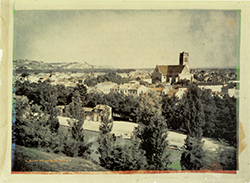 Early color photo of Agen, France, by Louis Ducos du Hauron, 1877. The cathedral in the scene is the Cath drale Saint-Caprais d'Agen.
Early color photo of Agen, France, by Louis Ducos du Hauron, 1877. The cathedral in the scene is the Cath drale Saint-Caprais d'Agen.
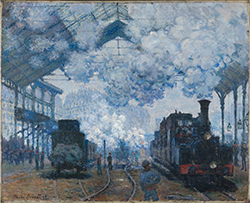 Painting by Claude Monet: The Gare Saint-Lazare: Arrival of a Train. The Gare Saint-Lazare has been represented in a number of artworks. It attracted artists during the Impressionist period and many of them lived very close to the Gare St-Lazare during the 1870s and 1880s. In 1877, painter Claude Monet rented a studio near the Gare Saint Lazare. That same year he exhibited seven paintings of the railway station in an impressionist painting exhibition. He completed several paintings of this subject. The Gare Saint-Lazare is far different than Monet's previous paintings of harbors, boats and oceans that viewers had seen before. The Gare Saint-Lazare series of paintings lead the viewers through a tour of the train station in different points of the day. Monet exemplifies the modern life, in all its chaos and instability, The steam coming from the trains creates a way of dissolving the train and showing the impressionistic style of blending colors and light. Everything dissipates with the steam of the train and turns into a flurry of blended colors. As said by mile Zola, Monet is able to turn a normally dirty and gritty place into a peaceful and beautiful scene You can hear the trains rumbling in, see the smoke billow up under the huge roofs that is where painting is today our artists have to find the poetry in train station, the way their fathers found the poetry in forests and rivers. Monet's work on the Gare Saint-Lazare is unparalleled in its evocation of steamm and the smoke-filled station. In spite of the impressionist style, the work reproduces accurately the topography of the area, even allowing one to deduce the precise point where the artist was standing while painting. This is the first time an artist had showed a single theme through a series of variations
Painting by Claude Monet: The Gare Saint-Lazare: Arrival of a Train. The Gare Saint-Lazare has been represented in a number of artworks. It attracted artists during the Impressionist period and many of them lived very close to the Gare St-Lazare during the 1870s and 1880s. In 1877, painter Claude Monet rented a studio near the Gare Saint Lazare. That same year he exhibited seven paintings of the railway station in an impressionist painting exhibition. He completed several paintings of this subject. The Gare Saint-Lazare is far different than Monet's previous paintings of harbors, boats and oceans that viewers had seen before. The Gare Saint-Lazare series of paintings lead the viewers through a tour of the train station in different points of the day. Monet exemplifies the modern life, in all its chaos and instability, The steam coming from the trains creates a way of dissolving the train and showing the impressionistic style of blending colors and light. Everything dissipates with the steam of the train and turns into a flurry of blended colors. As said by mile Zola, Monet is able to turn a normally dirty and gritty place into a peaceful and beautiful scene You can hear the trains rumbling in, see the smoke billow up under the huge roofs that is where painting is today our artists have to find the poetry in train station, the way their fathers found the poetry in forests and rivers. Monet's work on the Gare Saint-Lazare is unparalleled in its evocation of steamm and the smoke-filled station. In spite of the impressionist style, the work reproduces accurately the topography of the area, even allowing one to deduce the precise point where the artist was standing while painting. This is the first time an artist had showed a single theme through a series of variations
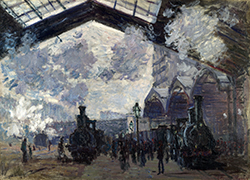 Painting by Claude Monet: The Gare Saint-Lazare. The Gare Saint-Lazare has been represented in a number of artworks. It attracted artists during the Impressionist period and many of them lived very close to the Gare St-Lazare during the 1870s and 1880s. In 1877, painter Claude Monet rented a studio near the Gare Saint Lazare. That same year he exhibited seven paintings of the railway station in an impressionist painting exhibition. He completed several paintings of this subject. The Gare Saint-Lazare is far different than Monet's previous paintings of harbors, boats and oceans that viewers had seen before. The Gare Saint-Lazare series of paintings lead the viewers through a tour of the train station in different points of the day. Monet exemplifies the modern life, in all its chaos and instability, The steam coming from the trains creates a way of dissolving the train and showing the impressionistic style of blending colors and light. Everything dissipates with the steam of the train and turns into a flurry of blended colors. As said by mile Zola, Monet is able to turn a normally dirty and gritty place into a peaceful and beautiful scene You can hear the trains rumbling in, see the smoke billow up under the huge roofs that is where painting is today our artists have to find the poetry in train station, the way their fathers found the poetry in forests and rivers. Monet's work on the Gare Saint-Lazare is unparalleled in its evocation of steamm and the smoke-filled station. In spite of the impressionist style, the work reproduces accurately the topography of the area, even allowing one to deduce the precise point where the artist was standing while painting. This is the first time an artist had showed a single theme through a series of variations
Painting by Claude Monet: The Gare Saint-Lazare. The Gare Saint-Lazare has been represented in a number of artworks. It attracted artists during the Impressionist period and many of them lived very close to the Gare St-Lazare during the 1870s and 1880s. In 1877, painter Claude Monet rented a studio near the Gare Saint Lazare. That same year he exhibited seven paintings of the railway station in an impressionist painting exhibition. He completed several paintings of this subject. The Gare Saint-Lazare is far different than Monet's previous paintings of harbors, boats and oceans that viewers had seen before. The Gare Saint-Lazare series of paintings lead the viewers through a tour of the train station in different points of the day. Monet exemplifies the modern life, in all its chaos and instability, The steam coming from the trains creates a way of dissolving the train and showing the impressionistic style of blending colors and light. Everything dissipates with the steam of the train and turns into a flurry of blended colors. As said by mile Zola, Monet is able to turn a normally dirty and gritty place into a peaceful and beautiful scene You can hear the trains rumbling in, see the smoke billow up under the huge roofs that is where painting is today our artists have to find the poetry in train station, the way their fathers found the poetry in forests and rivers. Monet's work on the Gare Saint-Lazare is unparalleled in its evocation of steamm and the smoke-filled station. In spite of the impressionist style, the work reproduces accurately the topography of the area, even allowing one to deduce the precise point where the artist was standing while painting. This is the first time an artist had showed a single theme through a series of variations
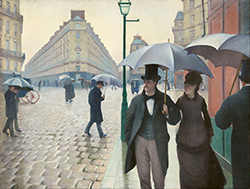 Painting by Gustave Caillebotte: Paris Street; Rainy Day (French Rue de Paris, temps de pluie) is his best known work. It shows a number of individuals walking through the Place de Dublin, in 1877 known as the Carrefour de Moscou, at an intersection to the east of the Gare Saint-Lazare in north Paris. Although Caillebotte was a friend and patron of many of the impressionist painters, and this work is part of that school, it differs in its realism and reliance on line rather than broad brush strokes. Caillebotte's interest in photography is evident. The figures in the foreground appear "out of focus", those in the mid-distance (the carriage and the pedestrians in the intersection) have sharp edges, while the features in the background become progressively indistinct. The severe cropping of some figures — particularly the man to the far right — further suggests the influence.
Painting by Gustave Caillebotte: Paris Street; Rainy Day (French Rue de Paris, temps de pluie) is his best known work. It shows a number of individuals walking through the Place de Dublin, in 1877 known as the Carrefour de Moscou, at an intersection to the east of the Gare Saint-Lazare in north Paris. Although Caillebotte was a friend and patron of many of the impressionist painters, and this work is part of that school, it differs in its realism and reliance on line rather than broad brush strokes. Caillebotte's interest in photography is evident. The figures in the foreground appear "out of focus", those in the mid-distance (the carriage and the pedestrians in the intersection) have sharp edges, while the features in the background become progressively indistinct. The severe cropping of some figures — particularly the man to the far right — further suggests the influence.
1877
 Hermann Fol reports watching the spermatozoan of a starfish penetrate the egg. He was able to see the transfer of the intact nucleus of the sperm into the egg, where it became the male pronucleus.
Hermann Fol reports watching the spermatozoan of a starfish penetrate the egg. He was able to see the transfer of the intact nucleus of the sperm into the egg, where it became the male pronucleus.
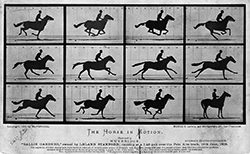 Photograph by Eadweard Muybridge: Sallie Gardner at a Gallop, also known as The Horse in Motion, is a series of photographs consisting of a galloping horse, the result of a photographic experiment on June 15, 1878. Sometimes cited as an early silent film, the series and later experiments like it were precursors to the development of motion pictures. The series consists of 24 photographs shot in rapid succession that were shown on a zoopraxiscope. Muybridge was commissioned by Leland Stanford, the industrialist and horseman, who was interested in gait analysis. The purpose of the shoot was to determine whether a galloping horse ever lifts all four feet completely off the ground during the gait; at this speed, the human eye cannot break down the action. Muybridge arranged 24 cameras, 27 inches apart, along a track parallel to the horse's path, with their shutters controlled by trip wires triggered by the horse's legs. The stop-action photographs showed the mare lifted all four legs off the ground at certain points during the gallop. Run together, the photographs produced the effect of the horse in motion, or a film.
Photograph by Eadweard Muybridge: Sallie Gardner at a Gallop, also known as The Horse in Motion, is a series of photographs consisting of a galloping horse, the result of a photographic experiment on June 15, 1878. Sometimes cited as an early silent film, the series and later experiments like it were precursors to the development of motion pictures. The series consists of 24 photographs shot in rapid succession that were shown on a zoopraxiscope. Muybridge was commissioned by Leland Stanford, the industrialist and horseman, who was interested in gait analysis. The purpose of the shoot was to determine whether a galloping horse ever lifts all four feet completely off the ground during the gait; at this speed, the human eye cannot break down the action. Muybridge arranged 24 cameras, 27 inches apart, along a track parallel to the horse's path, with their shutters controlled by trip wires triggered by the horse's legs. The stop-action photographs showed the mare lifted all four legs off the ground at certain points during the gallop. Run together, the photographs produced the effect of the horse in motion, or a film.
1878
 Wilhelm Friedrich Kühne proposed the term ENZYME (meaning "in yeast") and distinguished enzymes from the micro-organisms that produce them.
Wilhelm Friedrich Kühne proposed the term ENZYME (meaning "in yeast") and distinguished enzymes from the micro-organisms that produce them.
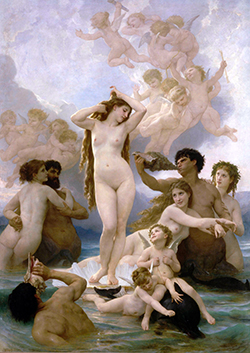 Painting by William-Adolphe Bouguereau: The Birth of Venus, one of Bouguereau's most famous paintings (now at the Musée d'Orsay, Paris). It depicts not the actual birth of Venus from the sea, but her transportation in a shell as a fully mature woman from the sea to Paphos in Cyprus. She is considered the epitome of the Classical Greek and Roman ideal of the female form and beauty, on par with Venus de Milo. For Bouguereau, it is considered a tour de force. The canvas stands at just over 300 centimetres (9 feet 10 inches) high, and 218 cm (7 ft 2 in) wide. The subject matter, as well as the composition, resembles a previous rendition of this subject, Sandro Botticelli's The Birth of Venus, as well as Raphael's The Triumph of Galatea.
Painting by William-Adolphe Bouguereau: The Birth of Venus, one of Bouguereau's most famous paintings (now at the Musée d'Orsay, Paris). It depicts not the actual birth of Venus from the sea, but her transportation in a shell as a fully mature woman from the sea to Paphos in Cyprus. She is considered the epitome of the Classical Greek and Roman ideal of the female form and beauty, on par with Venus de Milo. For Bouguereau, it is considered a tour de force. The canvas stands at just over 300 centimetres (9 feet 10 inches) high, and 218 cm (7 ft 2 in) wide. The subject matter, as well as the composition, resembles a previous rendition of this subject, Sandro Botticelli's The Birth of Venus, as well as Raphael's The Triumph of Galatea.
1879
 From 1879 through 1882, Walther Flemming describes and names CHROMATIN, MITOSIS, and the SPIREME. He makes the first accurate counts of chromosome numbers and accurately drew the "longitudinal splitting" of chromosomes.
From 1879 through 1882, Walther Flemming describes and names CHROMATIN, MITOSIS, and the SPIREME. He makes the first accurate counts of chromosome numbers and accurately drew the "longitudinal splitting" of chromosomes.
ESP Quick Facts
ESP Origins
In the early 1990's, Robert Robbins was a faculty member at Johns Hopkins, where he directed the informatics core of GDB — the human gene-mapping database of the international human genome project. To share papers with colleagues around the world, he set up a small paper-sharing section on his personal web page. This small project evolved into The Electronic Scholarly Publishing Project.
ESP Support
In 1995, Robbins became the VP/IT of the Fred Hutchinson Cancer Research Center in Seattle, WA. Soon after arriving in Seattle, Robbins secured funding, through the ELSI component of the US Human Genome Project, to create the original ESP.ORG web site, with the formal goal of providing free, world-wide access to the literature of classical genetics.
ESP Rationale
Although the methods of molecular biology can seem almost magical to the uninitiated, the original techniques of classical genetics are readily appreciated by one and all: cross individuals that differ in some inherited trait, collect all of the progeny, score their attributes, and propose mechanisms to explain the patterns of inheritance observed.
ESP Goal
In reading the early works of classical genetics, one is drawn, almost inexorably, into ever more complex models, until molecular explanations begin to seem both necessary and natural. At that point, the tools for understanding genome research are at hand. Assisting readers reach this point was the original goal of The Electronic Scholarly Publishing Project.
ESP Usage
Usage of the site grew rapidly and has remained high. Faculty began to use the site for their assigned readings. Other on-line publishers, ranging from The New York Times to Nature referenced ESP materials in their own publications. Nobel laureates (e.g., Joshua Lederberg) regularly used the site and even wrote to suggest changes and improvements.
ESP Content
When the site began, no journals were making their early content available in digital format. As a result, ESP was obliged to digitize classic literature before it could be made available. For many important papers — such as Mendel's original paper or the first genetic map — ESP had to produce entirely new typeset versions of the works, if they were to be available in a high-quality format.
ESP Help
Early support from the DOE component of the Human Genome Project was critically important for getting the ESP project on a firm foundation. Since that funding ended (nearly 20 years ago), the project has been operated as a purely volunteer effort. Anyone wishing to assist in these efforts should send an email to Robbins.
ESP Plans
With the development of methods for adding typeset side notes to PDF files, the ESP project now plans to add annotated versions of some classical papers to its holdings. We also plan to add new reference and pedagogical material. We have already started providing regularly updated, comprehensive bibliographies to the ESP.ORG site.
ESP Picks from Around the Web (updated 06 MAR 2017 )
Old Science
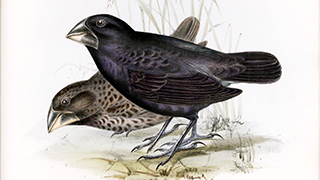
Weird Science
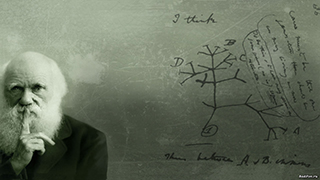
Treating Disease with Fecal Transplantation
Fossils of miniature humans (hobbits) discovered in Indonesia
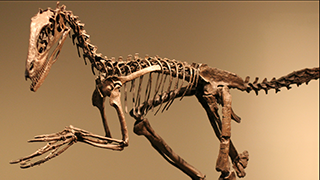
Dinosaur tail, complete with feathers, found preserved in amber.
Astronomy

Mysterious fast radio burst (FRB) detected in the distant universe.